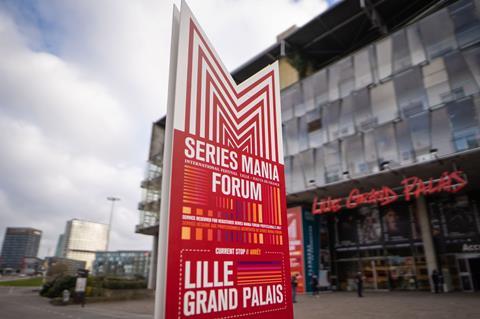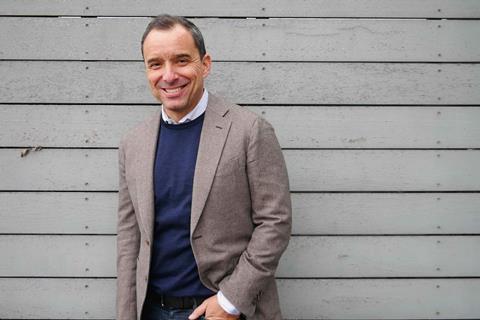The Euro push of the US streamers, the rise of the big European production groups and president Volodymyr Zelensky were among the topics in the spotlight.

The conference programme of the industry-focused Series Mania Forum, running March 22-24, put the spotlight on the platforms, production groups and individual talents shaking up the European drama scene as well as the hot topics at the heart of the business.
Screen breaks out some of the talking points.
US platforms and studios ramp up European push
The US streamers and studios were out in force once again at the Series Mania Forum, which has positioned itself as a useful platform for them to connect with the European drama scene.
HBO Max pitched up with the big guns of its European original content team, headed by Antony Root, EVP and head of original production EMEA.
Root said the last 18 months had been a time of “adjustment” rather than “radical change” as existing HBO Europe services in the Nordics, Spain and Central and Eastern Europe converted to the new SVoD model and HBO Max banner, with new Turkish and French offerings due to come online sometime in the near future.
Noting that HBO Europe had created 29 original drama series prior to the HBO Max transition, Root said the revamped platform remained “a local commissioning operation” but added the aim was to broaden the slate to draw in new subscribers. This would involve a doubling of its unscripted commissions, he revealed.
Not every local show commissioned for HBO Max could be a big-budget production, he added. “We do want different price points. We can’t make everything a super high expensive drama series. And that’s one of the things we’re working hard to figure out.”
Paramount International CEO Raffaele Annecchino also touched down to discuss the studio’s streaming strategy. He outlined its hybrid approach involving its own platform Paramount Plus and tie-in with SkyShowtime, which will make the studio’s content available via streaming in 60 European markets by the end of 2022. In a sign that the company is also muscling into original content from outside the US, Annecchino announced a major partnership with Gaumont for several high-end dramas.
Amazon Studios’ head of European Originals Georgia Brown also took to the stage. The executive, who first spoke at Series Mania in 2019 as her department was getting off the ground, said the operation had “come a very long way” in the interim with 50 European original drama launched by the end of last year. The original vision of putting the spotlight on local productions and new voices remained the same, she added, debuting trailers for the new Paul Pogba documentary as well as the UK grime and drill music-inspired drama Jungle as examples of this.
Burgeoning Europe production groups

The consolidation of Europe’s independent production drama sector into big groups was also under the spotlight with executives from burgeoning groups ITV Studios, Fremantle and Federation Entertainment joining a panel on the phenomenon.
“Big is not necessarily better but some scale is important. We have acquired a few companies lately, most recently, Lux Vide in Italy, an interest in Fabel in the US… and earlier in the year the NENT production companies,” commented Fremantle president of global drama Christian Vesper.
“For us, it’s looking at where we have gaps in our programming. It’s driven in large part by our distribution department in what they need for the pipeline but on the drama side, it’s also driven by access to talent and access to producer talent as well writer-director talent. Strategically, it’s not just about being bigger, it’s about what we need to support the group.”
ITV Studios, EVP of global content, said there was “strength and advantages” that came with scale but that the group worked hard to foster a spirit of independence among the 60 productions labels.
“We really believe that creativity flourishes best when it is independent and not driven by a corporate machine. Each company is the captain of its own ship but when something like Covid hits, it means they’re part of a flotilla where they can get support if they’re drowning.”
Marina Williams, co-founder and co-CEO of the Asacha Group, countered that size at any cost was not the way to go. “Scale is important, but it has to be manageable. For us, the synergy between the producers in the group is very important. We select our assets very carefully because we want our producers to work together on co-development and for Asacha to be a great home to mature talent. From that perspective, the size has to be manageable so that talent doesn’t get lost,” she said.
Lionel Uzan, co-founder and CEO of Federation Entertainment, suggested each of the big groups have something different to offer and suggested talent had to do their homework around which one would work for them.
“We [the big production groups] are all battling for the same talent but the reason why talent would choose one company over another comes down to the culture. We all bring different things to the table. Some have deeper pockets, others are more flexible, others more entrepreneurial, or stronger in distribution, or in certain territories. The talent has to ask why am I choosing this home? If it’s just the money, there are bigger players out there than us, if it’s not just the money, there need to be other reasons.”
Ukrainian president Volodymyr Zelensky, his trajectory from fiction to fact
The Russian invasion of Ukraine was never far from the minds of the TV drama professionals at Series Mania as the war continued to dominate headlines and news bulletins.
In the festival, Series Mania marked its solidarity with Ukraine by appointing Ukrainian film producer Julia Sinkevych as the president of the international competition jury.
At the Series Mania Forum, several professionals alluded to the conflict, with many making the point that telling European stories and championing cultural diversity in the drama sector, as well stamping out fake news in the factual arena, remained more important than ever
Ukrainian president Volodymyr Zelensky even came up in a panel exploring the soft power of drama series when the speakers touched on his trajectory as the creator and star of the political comedy-drama Servant Of The People.
“It’s like a Black Mirror episode. It’s ridiculous but it’s fantastic. He could easily be on the stage right now talking about his show,” said UK producer Bunmi Akintonwa. “He was at MIPCOM selling the show many years ago, he had a stand like many of us do.”
James Poniewozik, chief TV critic at The New York Times, commented on how the conduct of the show’s school teacher protagonist who is elected president, was close to that of Zelensky in his real-life role as the country’s wartime president.
“You can see in the way he has led Ukraine through this war, if you go back and watch Servant Of The People, that it is eerily similar to the themes in the show around the legitimacy of power, in which a good president does not separate himself in his mansion or his estate in Monte Carlo, but shares the privations and dangers of his people,” he said.
Philosophy professor Sandra Laugier noted how a US poll had shown that Martin Sheen would have been a potentially popular presidential candidate thanks to his role in The West Wing, but emphasised that Zelensky still remained a special case.
“The point is that this didn’t happen. There is something more in Zelensky and in his show, and its promotion of democratic values, which are global values,” she said.
Is the showrunner model transferable to Europe?
The European high-end drama boon had seen the region attempt to import the showrunner model from the US in recent years, but the jury is still out on whether it is directly transferable to Europe.
US showrunner, writer and executive producer Frank Spotnitz, Danish writer Jeppe Gjervig Gram, best-known for Borgen and Follow The Money; and acclaimed veteran German writer Annette Hess, whose recent credits include We Children From Bahnhof Zoo and the Ku’Damm franchise broached the issue in a panel entitled “Showrunnng: A European Approach”.
Asked to define the role of showrunner, Leonardo, Medici, and The Man In The High Castle writer-creator Spotnitz replied: “I actually don’t like the word ‘showrunner’ because it gives the lead creative more credit than he or she is due, but as the lead creative on a television series, you are the chief decision-maker. In American television, and I’ve been telling people this for years and they still don’t quite believe it’s possible, that person has always been the writer.
“The writer is the lead on every American TV show you like, that’s the way it’s run. The writer has the ultimate say on the budget, cast, editing, use of visual effects, everything you can imagine but the showrunner doesn’t do it alone. They have other capable producers, who know more about budgeting, scheduling or crews, but they have ultimate say.”
Hess said that no one was working in Germany in that way, although she acknowledged that on Ku’Damm she had played a decisive role, selecting the directors and closely overseeing the characterisation and dialogue, but was not always on set.
She recalled anecdotally how commissioning broadcaster ZDF’s championing of her as the drama’s “showrunner” at the premiere of the season Ku’Damm had irritated director Sven Bohse, even though they were on good terms.
“I remember him say, ‘If I hear the word ‘showrunner’ once again, I’m going to explode’,” she said. “You can see how difficult it is to find a definition. You have to talk about it before you start a project.”
Gjervig Gram agreed that while the term “showrunner” could confer too much importance to the role of the creator-writer in bringing a show to fruition, the common Danish term of “head writer’ was “too low”.
“You’re not the king, but you’re not just the ‘head writer’ when you’re in editing, casting and talking to directors, you’re running, at least in Denmark, the creative part of the show.”
Spotnitz suggested that there was space for traditional auteur-style productions or models that put either the director or creator-writer in the role of lead creative but the writer-showrunner model remained the best option for large-scale productions.
“If you’re doing shows of a certain scale of eight to 12 episodes a year and you want them delivered in a certain time frame, and then repeat that 12 months later, it’s really tough to do without a showrunner… and that’s why the system evolved in the United States.















![[L-R]: Amanda Villavieja, Laia Casanovas, Yasmina Praderas](https://d1nslcd7m2225b.cloudfront.net/Pictures/274x183/6/4/1/1471641_pxl_20251224_103354743_618426_crop.jpg)








![[L-R]: Amanda Villavieja, Laia Casanovas, Yasmina Praderas](https://d1nslcd7m2225b.cloudfront.net/Pictures/100x67/6/4/1/1471641_pxl_20251224_103354743_618426_crop.jpg)
No comments yet